Discover financial empowerment resources
Discover financial empowerment resources
The Money Guidance Competency Framework sets out the core competencies needed to provide a safe, quality service for customers. It is designed for anyone who provides any type of money guidance whatever their sector or job role. The competency framework for Money Guiders sets out the skills,...

The Behavioural Insights Team, in conjunction with Fair4All Finance, have worked with three community finance providers to launch a new customer engagement support guide to better improve customer engagement using insights from behavioural science. Building on our work with three lenders, this...
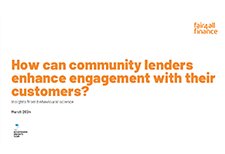
A government designs a great service or program to support its residents. Although many people qualify, the program receives just a few applications. How can we increase uptake? This is a common question the Behavioral Insights Team (BIT) has helped governments answer across many policy...
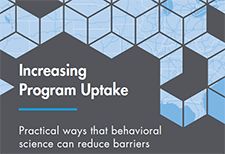
One of the goals of The Money and Pensions Service (MaPS) is to provide better debt advice. While debt advice is available in many different forms, many people who could benefit from debt advice do not seek help. In this study, we sought to better understand the barriers and drivers to people...
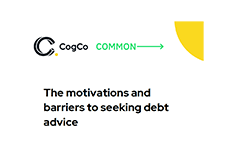
Innovative uses of digital technologies in the delivery of financial education can serve multiple complementary objectives and effectively support the building blocks of financial education. This Guidance was developed to assist policy makers in deciding when to adopt digital delivery, and how to...
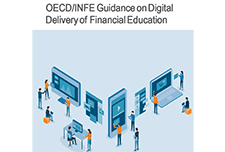
This report explores the connections between low income, poverty and protected characteristics, how these can shape the experience of poverty, and whether this can result in a similar inequality in terms of when and how poverty premiums are incurred. COVID-19 has thrown light on the link between...
This policy brief provides recommendations that can assist policy makers in their consideration of appropriate measures to help financial consumers, depending on the contexts and circumstances of individual jurisdictions, during the COVID-19 crisis. These options are consistent with...
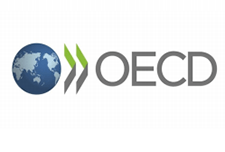
This policy brief outlines initial the measures that policy makers can make to increase citizen awareness about effective means of mitigation for the impact of the COVID-19 pandemic and its potential consequences on their financial resilience and...

Financial education has become an important complement to market conduct and prudential regulation and improving individual financial behaviours a long-term policy priority in many countries. The OECD and its International Network on Financial Education (INFE) conducts research and develops tools...

This document describes the types of knowledge that adults aged 18 or over could benefit from, what they should be capable of doing and the behaviours that may help them to achieve financial well-being, as well as the attitudes and confidence that will support this process. It can be used to...

The Organisation for Economic Co-operation and Development (OECD) is an international organisation establishes evidence-based international standards and finding solutions to a range of social, economic and environmental challenges. The OECD/INFE Toolkit includes a financial literacy questionnaire...

Fair By Design and Turn2Us (in the United Kingdom) commissioned this research to explore recent changes in the poverty premium landscape, to understand if they are having any impact on the cost of premiums, or the number of people who pay them. Importantly, we did this through the lens of the...
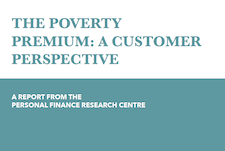
This report discusses the interactions between finances and mental health, based on the experience of over 5000 individuals who have lived with mental health problems. Mental health problems leading to relationship difficulties, physical health problems, mental health treatments, cognitive...

Financial problems can be a significant source of distress, putting pressure on people's mental health, particularly if they are treated insensitively by creditors. Some people in financial difficulty cut back on essentials, such as heating and eating, or social activities that support their well...
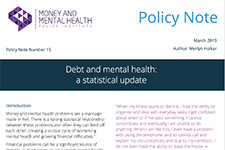
This new research study: the 2016 UK Children and Young People’s Financial Capability Survey, is the first of its kind: a nationally representative survey of the financial knowledge, attitudes and behaviours of 4- to 17-year-olds and their parents, living in the UK. A total of 4,958 children and...
The United Kingdom is at the forefront of the global finance industry and is a leader in the fields of financial services, technology and innovation. Despite this high standing, a sizeable number of UK citizens lack access to even the most basic financial services, while still more are forced to...
People living on low incomes have historically been excluded from politics and policy debates, even when the question at hand is how poverty can be reduced or its impacts mitigated. The aim of this research was to explore how people on low incomes perceive politics, understand how far they feel...
This report was commissioned by the SMCPC for the purpose of replicating for the British case, as far as possible, the findings in Our Kids. In this era in which public concern about poverty, inequality, and social mobility has been increasing, our primary aim in this report is to find out if the...
This review looks at the activities, impact, and drivers and barriers to success of four types of community-led approaches: voluntary action, community organising, social action and community economic...
In this paper we seek to determine the effect of assets held in early adult life on later outcomes. We specifically look at wages, employment prospects, general health and malaise. We employ a number of statistical techniques in our search for the causal effect of assets on adult health and...
This guidance note is intended as a practical guide to designing a monitoring and evaluation (M&E) framework for policy research projects or programmes. Its primary audience is M&E designers and managers but it can be useful for anyone involved with M&E activities. The guidance note...
An individual asset account that can be accessed before the age of 18 could help children in care to develop a sense of control and some measure of security in their lives, support key transitions post-16, overcome some of the barriers to participation in extra-curricular activities, and reward...
In 2005 the Financial Services Authority (FSA) commissioned the Personal Finance Research Centre to undertake an exploratory, methodological study to design a baseline questionnaire that could be used to measure levels of financial capability in the UK. In this report we begin by outlining the...
Tools for Development draws together a range of techniques designed to help DFID officers and others undertake development activities and interventions of any size and kind. Tools for Development aims to help you deliver successful development activities and interventions by giving you access to...
The 2005 Baseline Survey of Financial Capability (BSFC) was designed by the Personal Finance Research Centre on behalf of the Financial Services Authority to measure the four domains of financial capability which we had identified in earlier exploratory work with consumers. The questions set out in...
